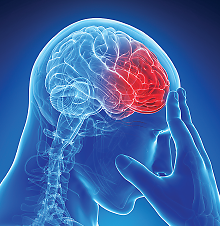Study Links Anxiety to Stroke Occurrence
Abstract
Individuals for whom anxiety is a common state appear to be most at risk for stroke, independent of other stroke risk factors.
Prolonged elevated anxiety has been suggested by both scientists and clinicians to be a risk factor for stroke. Researchers from the University of Pittsburgh and Harvard School of Public Health conducted a study to confirm whether such an association does in fact exist. They reported their findings in the December 19, 2013, issue of Stroke.
In a given year, 6.8 million Americans suffer from anxiety symptoms, according to the National Institute of Mental Health. Symptoms can include excessive feelings of fear, uneasiness, and worry—often lasting at least six months
“Everyone has some anxiety now and then. But when it’s elevated or chronic, it may have an effect on your vasculature years down the road,” said Maya Lambiase, Ph.D., a cardiovascular behavioral medicine researcher in the Department of Psychiatry at the University of Pittsburgh School of Medicine and the study’s lead author.
She explained to Psychiatric News that while previous studies have examined the relationship between anxiety and coronary heart disease, very few have explicitly investigated the association between anxiety and stroke—the fourth most common cause of death and a leading cause of disability in the United States.
“Understanding the association between anxiety and stroke is important given that anxiety symptoms are common and anxiety disorders are one of the most prevalent psychiatric disorders among the general population,” wrote Lambiase, who said in an interview that the current study is the first to report an association between heightened anxiety symptoms and stroke risk, despite other risk factors such as depression.

In the study, Lambiase and colleagues evaluated data from more than 6,000 Americans from diverse backgrounds aged 25 to 74 who had not experienced a stroke prior to study initiation. Participants were required to complete two General Well-Being Schedule questionnaires that measured anxiety and depression levels. Individuals were then followed for up to 22 years. Stroke occurrences in the subjects were determined through death certificates and hospital and nursing-home reports.
At the end of study, 419 incidents—6 percent—of stroke cases were reported among participants. The results showed that highly anxious individuals were 33 percent more likely to experience a stroke than their less-anxious counterparts. This risk persisted after controlling for, race, sex, socioeconomic factors, and depression symptoms.
“Most of the focus [on mental health and stroke] up until this point has been on depression. These findings underscore the importance of also considering anxiety when considering cardiovascular diseases,” said Rebecca Thurston, Ph.D., senior author of the study and an associate professor of psychiatry at the University of Pittsburgh. “These findings encourage practitioners to assess and treat anxiety, as well as to reconsider popular notions such as ‘worried well’—this worrying may not make us so well.”
The researchers added that people with high anxiety levels are more likely to smoke and be physically inactive. They speculate that this could be a pathway linking anxiety with stroke risk, in addition to biological factors such as elevated levels of stress hormones and increased sympathetic output.
Lambiase told Psychiatric News that “future work is definitely needed to determine the mechanisms whereby greater levels of anxiety are associated with an increased risk of stroke.”
Until a mechanism is identified to link the highest level of anxiety with stroke occurrence, the authors emphasized that more education and awareness on managing anxiety will be crucial.
The study was funded by the National Heart, Lung, and Blood Institute and National Institute of Mental Health. ■
An abstract of “Prospective Study of Anxiety and Incident Stroke” is posted at http://stroke.ahajournals.org/content/early/2013/12/19/STROKEAHA.113.003741.abstract.



